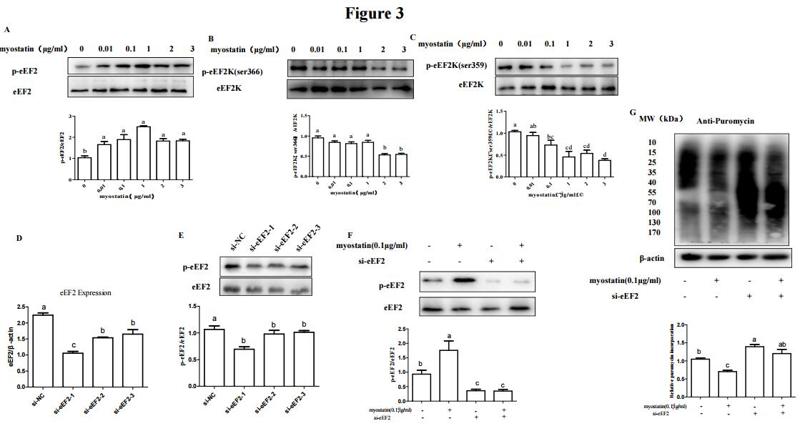EEF2 Antibody - #AF7721
| Product: | EEF2 Antibody |
| Catalog: | AF7721 |
| Description: | Rabbit polyclonal antibody to EEF2 |
| Application: | WB IF/ICC |
| Cited expt.: | WB |
| Reactivity: | Human, Mouse, Rat |
| Prediction: | Pig, Bovine, Horse, Sheep, Dog, Chicken |
| Mol.Wt.: | 95kDa; 95kD(Calculated). |
| Uniprot: | P13639 |
| RRID: | AB_2844085 |
Related Downloads
Protocols
Product Info
*The optimal dilutions should be determined by the end user. For optimal experimental results, antibody reuse is not recommended.
*Tips:
WB: For western blot detection of denatured protein samples. IHC: For immunohistochemical detection of paraffin sections (IHC-p) or frozen sections (IHC-f) of tissue samples. IF/ICC: For immunofluorescence detection of cell samples. ELISA(peptide): For ELISA detection of antigenic peptide.
Cite Format: Affinity Biosciences Cat# AF7721, RRID:AB_2844085.
Fold/Unfold
EEF 2; Eef2; EF-2; EF2; EF2_HUMAN; Elongation factor 2; Eukaryotic translation elongation factor 2; Polypeptidyl tRNA translocase; SCA26;
Immunogens
A synthesized peptide derived from human EEF2, corresponding to a region within N-terminal amino acids.
- P13639 EF2_HUMAN:
- Protein BLAST With
- NCBI/
- ExPASy/
- Uniprot
MVNFTVDQIRAIMDKKANIRNMSVIAHVDHGKSTLTDSLVCKAGIIASARAGETRFTDTRKDEQERCITIKSTAISLFYELSENDLNFIKQSKDGAGFLINLIDSPGHVDFSSEVTAALRVTDGALVVVDCVSGVCVQTETVLRQAIAERIKPVLMMNKMDRALLELQLEPEELYQTFQRIVENVNVIISTYGEGESGPMGNIMIDPVLGTVGFGSGLHGWAFTLKQFAEMYVAKFAAKGEGQLGPAERAKKVEDMMKKLWGDRYFDPANGKFSKSATSPEGKKLPRTFCQLILDPIFKVFDAIMNFKKEETAKLIEKLDIKLDSEDKDKEGKPLLKAVMRRWLPAGDALLQMITIHLPSPVTAQKYRCELLYEGPPDDEAAMGIKSCDPKGPLMMYISKMVPTSDKGRFYAFGRVFSGLVSTGLKVRIMGPNYTPGKKEDLYLKPIQRTILMMGRYVEPIEDVPCGNIVGLVGVDQFLVKTGTITTFEHAHNMRVMKFSVSPVVRVAVEAKNPADLPKLVEGLKRLAKSDPMVQCIIEESGEHIIAGAGELHLEICLKDLEEDHACIPIKKSDPVVSYRETVSEESNVLCLSKSPNKHNRLYMKARPFPDGLAEDIDKGEVSARQELKQRARYLAEKYEWDVAEARKIWCFGPDGTGPNILTDITKGVQYLNEIKDSVVAGFQWATKEGALCEENMRGVRFDVHDVTLHADAIHRGGGQIIPTARRCLYASVLTAQPRLMEPIYLVEIQCPEQVVGGIYGVLNRKRGHVFEESQVAGTPMFVVKAYLPVNESFGFTADLRSNTGGQAFPQCVFDHWQILPGDPFDNSSRPSQVVAETRKRKGLKEGIPALDNFLDKL
Predictions
Score>80(red) has high confidence and is suggested to be used for WB detection. *The prediction model is mainly based on the alignment of immunogen sequences, the results are for reference only, not as the basis of quality assurance.
High(score>80) Medium(80>score>50) Low(score<50) No confidence
Research Backgrounds
Catalyzes the GTP-dependent ribosomal translocation step during translation elongation. During this step, the ribosome changes from the pre-translocational (PRE) to the post-translocational (POST) state as the newly formed A-site-bound peptidyl-tRNA and P-site-bound deacylated tRNA move to the P and E sites, respectively. Catalyzes the coordinated movement of the two tRNA molecules, the mRNA and conformational changes in the ribosome.
Phosphorylation by EF-2 kinase completely inactivates EF-2; it requires prior phosphorylation by CDK2 at Ser-595 during mitotic prometaphase. Phosphorylation by CSK promotes SUMOylation, proteolytic cleavage, and nuclear translocation if the C-terminal fragment.
Diphthamide is 2-[3-carboxyamido-3-(trimethyl-ammonio)propyl]histidine (By similarity).
(Microbial infection) Diphthamide can be ADP-ribosylated by diphtheria toxin and by Pseudomonas exotoxin A, thus arresting protein synthesis.
ISGylated.
Proteolytically processed at two sites following phosphorylation by CSK.
SUMOylated following phosphorylation by CSK, promotes proteolytic cleavage.
Cytoplasm. Nucleus.
Note: Phosphorylation by CSK promotes cleavage and SUMOylation-dependent nuclear translocation of the C-terminal cleavage product.
Belongs to the TRAFAC class translation factor GTPase superfamily. Classic translation factor GTPase family. EF-G/EF-2 subfamily.
Research Fields
· Environmental Information Processing > Signal transduction > AMPK signaling pathway. (View pathway)
· Organismal Systems > Endocrine system > Oxytocin signaling pathway.
References
Application: WB Species: mouse Sample:
Application: WB Species: mouse Sample: C2C12 myotubes
Restrictive clause
Affinity Biosciences tests all products strictly. Citations are provided as a resource for additional applications that have not been validated by Affinity Biosciences. Please choose the appropriate format for each application and consult Materials and Methods sections for additional details about the use of any product in these publications.
For Research Use Only.
Not for use in diagnostic or therapeutic procedures. Not for resale. Not for distribution without written consent. Affinity Biosciences will not be held responsible for patent infringement or other violations that may occur with the use of our products. Affinity Biosciences, Affinity Biosciences Logo and all other trademarks are the property of Affinity Biosciences LTD.



